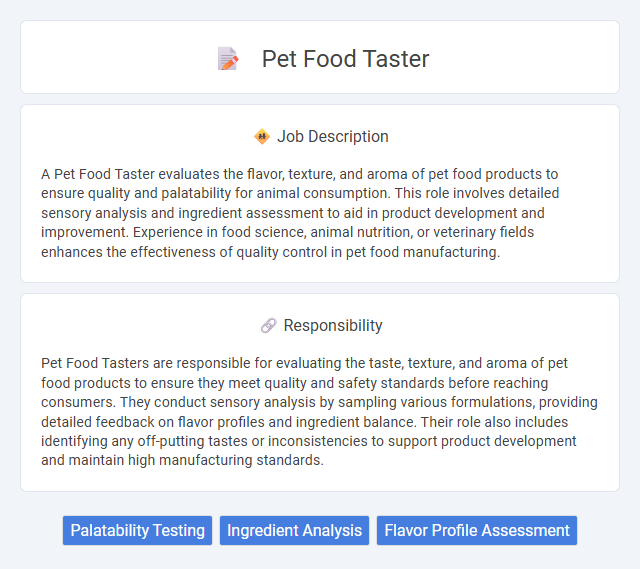
A Pet Food Taster evaluates the flavor, texture, and aroma of pet food products to ensure quality and palatability for animal consumption. This role involves detailed sensory analysis and ingredient assessment to aid in product development and improvement. Experience in food science, animal nutrition, or veterinary fields enhances the effectiveness of quality control in pet food manufacturing.
People with a strong sense of taste and smell, good attention to detail, and a passion for pet nutrition are likely suitable for a pet food taster role. Those with food allergies or sensitivities may find the job challenging due to constant exposure to various pet food ingredients. Individuals who enjoy repetitive sensory testing and can maintain objectivity despite unappealing flavors might have a higher probability of thriving in this position.
Qualification
A Pet Food Taster must possess a keen sense of taste and smell, along with knowledge of animal nutrition and food safety standards. Qualifications often include a background in food science, animal science, or a related field, combined with experience in sensory evaluation or quality control. Strong attention to detail and the ability to detect subtle flavor and texture differences in pet food formulations are essential for this role.
Responsibility
Pet Food Tasters are responsible for evaluating the taste, texture, and aroma of pet food products to ensure they meet quality and safety standards before reaching consumers. They conduct sensory analysis by sampling various formulations, providing detailed feedback on flavor profiles and ingredient balance. Their role also includes identifying any off-putting tastes or inconsistencies to support product development and maintain high manufacturing standards.
Benefit
Working as a pet food taster likely offers the benefit of contributing directly to the quality and safety of products for pets, ensuring that they receive nutritious and palatable meals. There is a probability of gaining unique insights into pet nutrition and flavor development, which can be valuable for careers in animal nutrition or food science. This role may also provide a chance to work in innovative, research-driven environments, potentially leading to specialized expertise in pet food formulation.
Challenge
The role of a Pet Food Taster likely presents unique challenges due to the need to evaluate flavors and textures that appeal to animals rather than humans. It may require a strong palate and sensitivity to subtle differences in ingredients to ensure product quality and safety. The position probably demands consistent attention to detail and adaptability to new formulations and pet nutritional requirements.
Career Advancement
A Pet Food Taster position offers unique opportunities for career advancement within the pet nutrition industry, allowing professionals to move into roles such as Quality Control Specialist, Product Developer, and Flavor Chemist. Mastery in sensory evaluation techniques and knowledge of pet dietary requirements can lead to leadership positions in research and development or regulatory affairs. Continuous education and certification in animal nutrition enhance prospects for senior roles in pet food manufacturing companies and specialty food labs.
Key Terms
Palatability Testing
Pet Food Taster roles primarily involve palatability testing to evaluate flavor, texture, and aroma, ensuring pet products meet quality and taste standards. Sensory analysis techniques and structured taste panels measure animal acceptance and preference, guiding formulation improvements for market success. Expertise in ingredient interactions and pet dietary needs supports developing nutritionally balanced, appealing products aligned with industry regulations.
Ingredient Analysis
Pet food tasters specialize in ingredient analysis to ensure product quality, safety, and palatability for pets. They evaluate the sensory attributes of raw materials, identifying off-flavors, contaminants, and consistency in flavor profiles. Rigorous ingredient analysis supports the development of nutritionally balanced pet foods that meet regulatory standards and consumer expectations.
Flavor Profile Assessment
Pet food tasters specialize in evaluating flavor profiles to ensure products meet palatability standards preferred by pets. They assess taste, aroma, texture, and overall acceptance to optimize formulations for pet satisfaction and nutritional value. This detailed flavor profile assessment supports the development of appealing and balanced pet food recipes.
 kuljobs.com
kuljobs.com